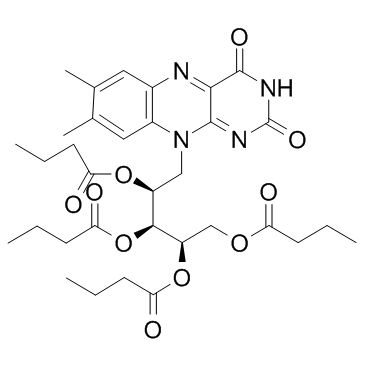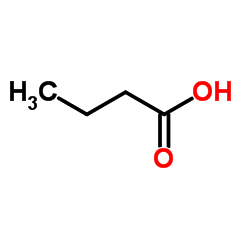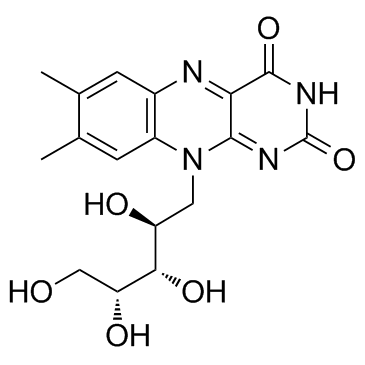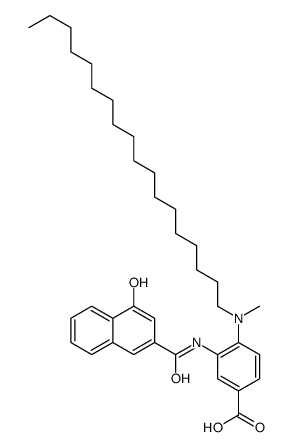752-56-7
| 中文名 | 四丁酸核黄素酯 |
|---|---|
| 英文名 | Riboflavin Tetrabutyrate |
| 中文别名 |
核黄素四丁酸酯
维脉宁 四丁酸核糖黄素酯 |
| 英文别名 | riboflavine tetrabutyrate |
| 描述 | Riboflavin tetrabutyrate是具有抗氧化和脂质过氧化物去除活性的亲脂性黄素衍生物。 |
|---|---|
| 相关类别 | |
| 体外研究 | 核黄素四丁酸盐通过脂质过氧化抑制氧摄取。核黄素四丁酸酯抑制NADPH偶联和抗坏血酸诱导的微粒体脂质过氧化。在酶促氧化-还原反应过程中,在氢原子从多不饱和脂肪酸的活性亚甲基中被提取为自由基时,核黄素四丁酸酯似乎表现出其抗氧化作用[1]。 |
| 体内研究 | 核黄素四丁酸酯可能通过抑制脂质过氧化作用改善患有动脉粥样硬化,糖尿病,脂肪肝等的患者的脂质代谢,从而导致血脂升高[1]。饲喂核黄素四丁酸酯导致3-酮脂酰辅酶A硫解酶的肝活性增加50%的对照水平,而肾3-酮酰辅酶A硫解酶和肝和肾酰辅酶A合成酶和酰基-的活性增加。 CoA脱氢酶保持不受影响。肝脏3-酮脂酰辅酶A硫解酶活性的增加表明,长期使用核黄素四丁酸盐会导致肝脏中脂肪酸的β-氧化增加[2]。 |
| 动物实验 | 大鼠:将核黄素四丁酸酯-14C(700μg,相当于400μg核黄素;总放射性2.19×105cpm)悬浮于0.2mL大豆油中并按口服给药。在注射的情况下,将相同量的核黄素四丁酸酯-14C溶解在1mL大豆油中并皮下注射到大鼠背部[3]。 |
| 参考文献 |
| 密度 | 1.29g/cm3 |
|---|---|
| 熔点 | 149ºC |
| 分子式 | C33H44N4O10 |
| 分子量 | 656.72300 |
| 精确质量 | 656.30600 |
| PSA | 185.84000 |
| LogP | 3.72880 |
| 折射率 | 1.584 |
| 储存条件 | 室温 |
|
Riboflavin Tetrabutyrate
Revision number: 5
SAFETY DATA SHEET Section1. IDENTIFICATION Product name:Riboflavin Tetrabutyrate Revision number:5 Section2. HAZARDS IDENTIFICATION GHS classification PHYSICAL HAZARDSNot classified Not classified HEALTH HAZARDS ENVIRONMENTAL HAZARDSNot classified GHS label elements, including precautionary statements Pictograms or hazard symbolsNone No signal word Signal word Hazard statementsNone None Precautionary statements: Section3. COMPOSITION/INFORMATION ON INGREDIENTS Substance/mixture:Substance Components:Riboflavin Tetrabutyrate Percent:>98.0%(LC) CAS Number:752-56-7 Synonyms:Vitamin B2 Tetrabutyrate Chemical Formula:C33H44N4O10 Section4. FIRST AID MEASURES Inhalation:Remove victim to fresh air and keep at rest in a position comfortable for breathing. Get medical advice/attention if you feel unwell. Skin contact:Remove/Take off immediately all contaminated clothing. Rinse skin with water/shower. If skin irritation or rash occurs: Get medical advice/attention. Eye contact:Rinse cautiously with water for several minutes. Remove contact lenses, if present and easy to do. Continue rinsing. If eye irritation persists: Get medical advice/attention. Ingestion:Get medical advice/attention if you feel unwell. Rinse mouth. Protection of first-aiders:A rescuer should wear personal protective equipment, such as rubber gloves and air- tight goggles. Section5. FIRE-FIGHTING MEASURES Suitable extinguishingDry chemical, foam, water spray, carbon dioxide. media: Specific hazards arising Take care as it may decompose upon combustion or in high temperatures to from the chemical:generate poisonous fume. Riboflavin Tetrabutyrate Section5. FIRE-FIGHTING MEASURES Precautions for firefighters: Fire-extinguishing work is done from the windward and the suitable fire-extinguishing method according to the surrounding situation is used. Uninvolved persons should evacuate to a safe place. In case of fire in the surroundings: Remove movable containers if safe to do so. Special protectiveWhen extinguishing fire, be sure to wear personal protective equipment. equipment for firefighters: Section6. ACCIDENTAL RELEASE MEASURES Use personal protective equipment. Keep people away from and upwind of spill/leak. Personal precautions, protective equipment and Entry to non-involved personnel should be controlled around the leakage area by emergency procedures: roping off, etc. Environmental precautions: Prevent product from entering drains. Methods and materials for Sweep dust to collect it into an airtight container, taking care not to disperse it. containment and cleaning Adhered or collected material should be promptly disposed of, in accordance with up: appropriate laws and regulations. Section7. HANDLING AND STORAGE Precautions for safe handling Handling is performed in a well ventilated place. Wear suitable protective equipment. Technical measures: Prevent dispersion of dust. Wash hands and face thoroughly after handling. Use a local exhaust if dust or aerosol will be generated. Advice on safe handling: Avoid contact with skin, eyes and clothing. Conditions for safe storage, including any incompatibilities Storage conditions:Keep container tightly closed. Store in a cool and dark place. Store away from incompatible materials such as oxidizing agents. Packaging material:Comply with laws. Section8. EXPOSURE CONTROLS / PERSONAL PROTECTION Install a closed system or local exhaust as possible so that workers should not be Engineering controls: exposed directly. Also install safety shower and eye bath. Personal protective equipment Respiratory protection: Dust respirator. Follow local and national regulations. Hand protection:Protective gloves. Eye protection:Safety glasses. A face-shield, if the situation requires. Skin and body protection: Protective clothing. Protective boots, if the situation requires. Section9. PHYSICAL AND CHEMICAL PROPERTIES Physical state (20°C):Solid Form:Crystal- Powder Colour:Reddish yellow - Yellow red Odour:No data available pH: No data available Melting point/freezing point:149°C No data available Boiling point/range: Flash point:No data available Flammability or explosive limits: No data available Lower: Upper:No data available No data available Relative density: Solubility(ies): Very slightly soluble [Water] [Other solvents] Ethanol Soluble: Slightly soluble:Ether Riboflavin Tetrabutyrate Section10. STABILITY AND REACTIVITY Chemical stability:Stable under proper conditions. Possibility of hazardous No special reactivity has been reported. reactions: Incompatible materials: Oxidizing agents Hazardous decomposition Carbon monoxide, Carbon dioxide, Nitrogen oxides (NOx) products: Section11. TOXICOLOGICAL INFORMATION Acute Toxicity:ipr-rat LD50:>4500 mg/kg orl-rat LD50:>7500 mg/kg Skin corrosion/irritation: No data available No data available Serious eye damage/irritation: Germ cell mutagenicity: No data available Carcinogenicity: No data available IARC = NTP =No data available No data available Reproductive toxicity: RTECS Number:VJ1755000 Section12. ECOLOGICAL INFORMATION Ecotoxicity: Fish:No data available Crustacea:No data available Algae:No data available Persistence / degradability: No data available BioaccumulativeNo data available potential(BCF): Mobility in soil Log Pow:No data available Soil adsorption (Koc):No data available Henry's LawNo data available constant(PaM3/mol): Section13. DISPOSAL CONSIDERATIONS Recycle to process, if possible. Consult your local regional authorities. You may be able to dissolve or mix material with a combustible solvent and burn in a chemical incinerator equipped with an afterburner and scrubber system. Observe all federal, state and local regulations when disposing of the substance. Section14. TRANSPORT INFORMATION Hazards Class:Does not correspond to the classification standard of the United Nations UN-No:Not listed Section15. REGULATORY INFORMATION Safe management ordinance of dangerous chemical product (State Council announces on January 26, 2002 and revised on February 16,2011): Safe use and production, the storage of a dangerous chemical, transport, loading and unloading were prescribed. Riboflavin Tetrabutyrate SECTION 16 - ADDITIONAL INFORMATION N/A |
CHEMICAL IDENTIFICATION
HEALTH HAZARD DATAACUTE TOXICITY DATA
|
| 安全声明 (欧洲) | S22-S24/25 |
|---|
|
~% 
752-56-7 |
| 文献:Bulletin of the Chemical Society of Japan, , vol. 64, # 4 p. 1093 - 1096 |
|
~0% 
752-56-7 |
| 文献:Okuda; Horiguchi Chemical and pharmaceutical bulletin, 1980 , vol. 28, # 1 p. 181 - 188 |
|
~% 
752-56-7 |
| 文献:Photochemistry and Photobiology, , vol. 67, # 2 p. 192 - 197 |





